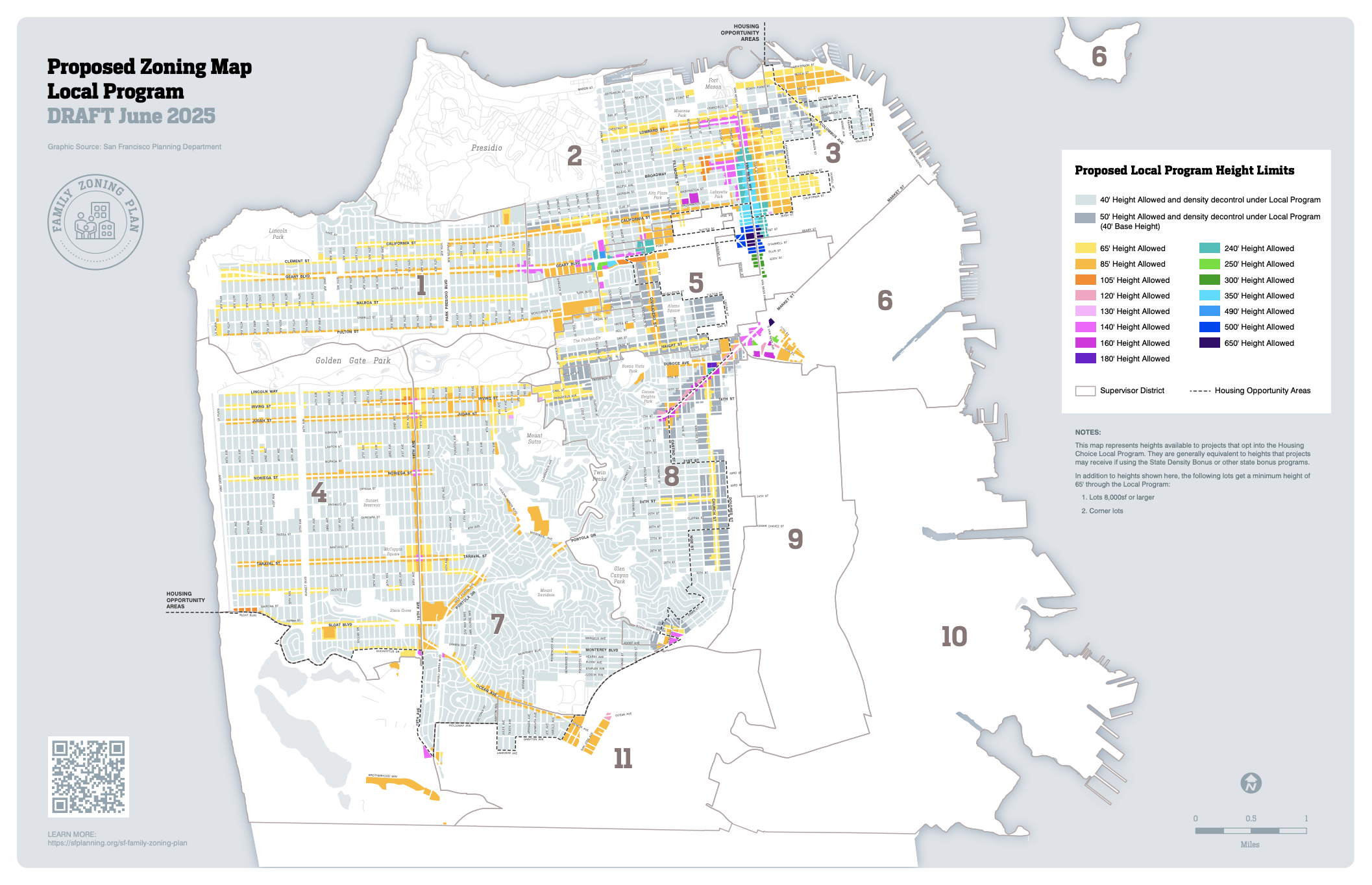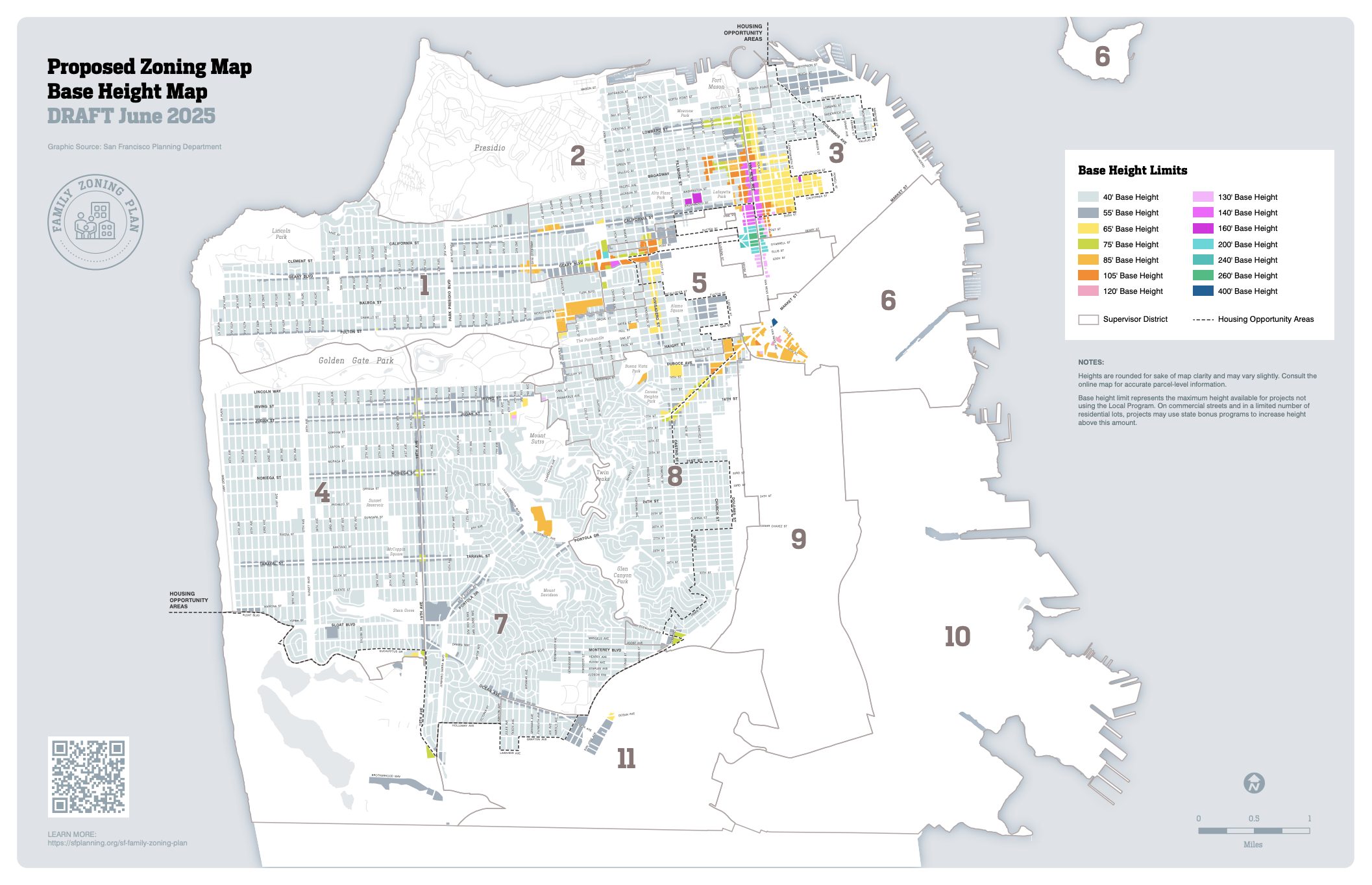San Francisco Mayor Daniel Lurie announced the introduction of his controversial upzoning plan Tuesday morning at a press conference on Ingleside’s Ocean Avenue.
Standing in Unity Plaza surrounded by city officials, supporters and easels with pictures of maps and streetscapes — and steps away from the soon-to-start Balboa Reservoir housing development — Lurie called Ocean Avenue a “zoning success story.”
“As part of the Balboa Park Station Area Plan, the city added 417 new homes near transit by transforming underused land like parking lots and [Municipal Transportation Agency] property into housing and into small businesses,” Lurie said. “What used to be a vacant concrete slab is now a four-story building with 27 units. What used to be just one shop is now a five-story building with 173 apartments, a Whole Foods, and over 150,000 square feet of retail. We need more projects like this.”
San Francisco has until 2031 to build 86,000 more housing units, as mandated by California state law. Lurie’s “family zoning” proposal, which he would go on to submit to the Board of Supervisors that afternoon, is one of the measures the city is taking to reach that goal. It would, if approved, increase the height limits and loosen the unit caps for properties across much of the city in a bid to unlock new construction.
“At the heart of family zoning is a simple idea,” Lurie said. "Families deserve to live in San Francisco. Not just visit, not just commute, but live here, grow here and thrive. They deserve a city that loves them back.”
Lurie’s plan includes base zoning changes and establishes a new local housing bonus program called Housing Choice San Francisco that aims to provide more adaptability for projects to meet affordable housing requirements through a variety of methods, like on-site affordable housing, paying an affordable housing fee, dedicating land or units off-site or providing 100% rent-controlled buildings.
Other key provisions from the plan include updating height and bulk zoning rules to support more housing and wider range of building types, forming new policies to encourage the creation of housing near public transit, creating a new zoning district that supports housing and small business near transit, maintaining tenant protections and simplifying the process for impacted business seeking to relocate.


New Planning Director Sarah Dennis Phillips called the legislative package “a monumental step.”
“It's a reach and we're going to get there and we're excited about moving that way,” Dennis Phillips said. “I think our progress will demonstrate that we can meet our state obligations while maintaining local control and honoring the unique character of our neighborhoods.”
Tiffany Zhang, owner of Little Panda Preschool, attended the conference. She said she supports more housing, but wants more parking, too.
“We’re happy for that because we definitely need more housing,” Zhang said. “A lot of community members and merchants have talked to me [about] what other things they need, which is parking.”
However, many homeowners' groups are mounting an opposition to the proposed rezoning.
District 11 Supervisor Chyanne Chen, who represents part of the greater Ingleside, had criticism for the mayor’s plan.
“The mayor’s rezoning plan does nothing to safeguard new sites for affordable projects,” Chen said in a statement to The Light. “We must do better — so tenants and small businesses are protected, families can stay and affordable and family-sized housing becomes a reality, not a dream.”
Chen authored a resolution urging the city to incorporate an affordable housing sites strategy into the rezoning. She is urging the Lurie “to go further to prioritize our local communities' needs and make affordable and family-sized housing more of a reality than a dream,” she said in a social media post on Wednesday. “If we do not actively plan to set aside these sites in a meaningful way, then we are not using all the tools available to us to deliver on the affordable housing we need,” Chen said.
Chen also articulated the downside of upzoning: stalled development proposals and real estate speculators. She singled out TJ Development, owner of four buildings on the 1600 block of Ocean Avenue, which has kept nearly a dozen storefronts vacant and blighted for many years while struggling to get a mixed-use development project approved or sell the properties.
The plan is roughly two years into its process and the team behind it plans to continue community engagement and will host informational hearings with the Planning Commission, Historic Preservation Commission and Small Business Commission, with dates that are to be determined.
By Summer through Fall of 2025, the plans will go through the adoption hearing process by the Planning Commission, Board of Supervisors Land Use & Transportation Committee, followed by the full Board and then to the mayor for signing before being submitted to the state’s Housing and Community Department. The state’s deadline for adoption is January 2026.
District 7 Supervisor Myrna Melgar, who represents part of the greater Ingleside, said there are numerous issues whenever zoning is changed, and San Francisco hasn't updated its rules in decades.
“I think over the next few months we’re going to have to do a lot of work to address those issues and tweak what the mayor has presented,” Melgar told The Light. “As chair of the Land Use & Transportation Committee, I’m firmly committed to seeing the process through to the end. What the mayor has introduced is not the end, it’s the beginning.”
Melgar has pending legislation related to the upzoning. She wants dedicated funding for affordable housing development, better tenant protections, small business displacement protections and a plan to incentivize rental units rather than condos on the westside.
“The devil’s in the details,” Melgar said of the rezoning.











